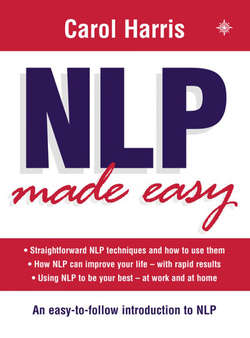Читать книгу NLP Made Easy - Carol Harris - Страница 5
Finding your Way around this Book
ОглавлениеWelcome to NLP Made Easy. There are many books on NLP, but what I have aimed at here is to provide a structured guide to the various elements of the topic. For the first time, there is a history of NLP in the UK; most published material has been based on the early origins of NLP in the United States, but it has a sound base in the UK, which deserves to be recorded. For this part of the book I am indebted to the writers who have submitted articles to Rapport (the magazine of the Association for Neuro-Linguistic Programming, of which I am the editor), giving their thoughts on the early days of NLP in the UK. I have also aimed to give a rather more detailed explanation of some of the NLP terms than is generally found in book glossaries. NLP can be very jargon-filled, which is perhaps understandable, given its history, but it can easily be practised without the use of complex terminology. However, given that that terminology is part of the inheritance of NLP, in the last section of the book I have provided some simple examples which I hope flesh out the basic terms in an understandable way.
The book is in three main parts:
Section One is about the origins and development of NLP and contains information on its history, notable people involved in its early development, and models, frameworks and techniques associated with it.
Section Two is about how you can apply NLP in your own life. This section includes three broad areas: personal growth, social relationships and business situations.
The appendices outline practical steps you can take if you wish to find out more about NLP, make use of the services of NLP-trained practitioners or pursue professional training in NLP yourself.
Each section has a brief introduction, outlining what is included and giving an overview of the topics covered. A more detailed explanation then follows.
The book can be read in a variety of ways, as each part has been designed to stand alone as well as to integrate with the rest of the book. You can choose to read it from start to finish, or you can select those sections which interest you most. If you prefer, you can look at the applications chapters first and then go back to read about the origins. A few topics are mentioned in more than one part of the book; this is intended to make the various sections as self-contained as possible.
NLP is very grounded in experience and I recommend that you take the time to do some of the exercises and activities. This will make the subject more real for you and give you a feel for how NLP actually works in practice. You might find it helpful to work through some of the exercises with another person and might also like to create a personal action plan, which will help you bring what you learn into everyday use.
I hope you enjoy finding out about this fascinating subject which has made a tremendous impact on so many people’s lives.
